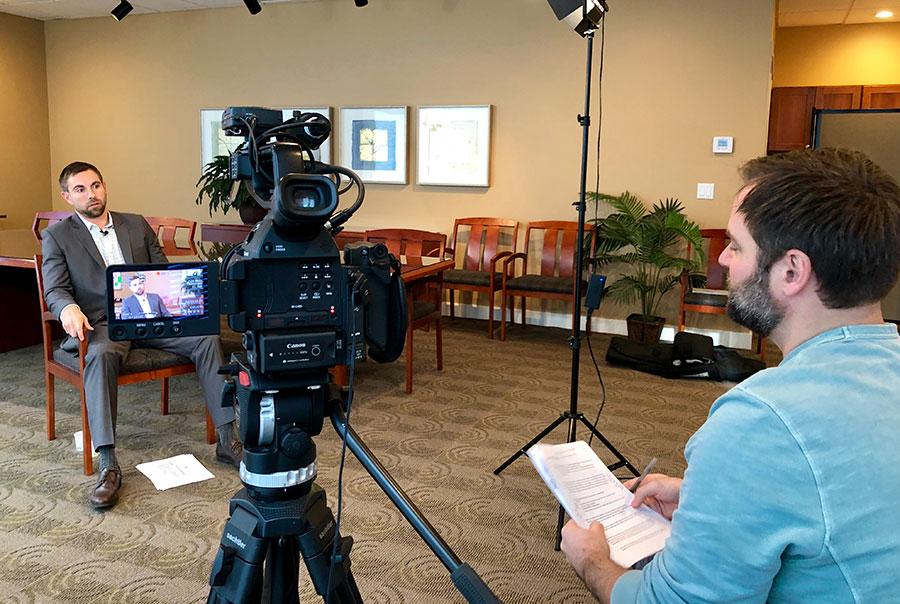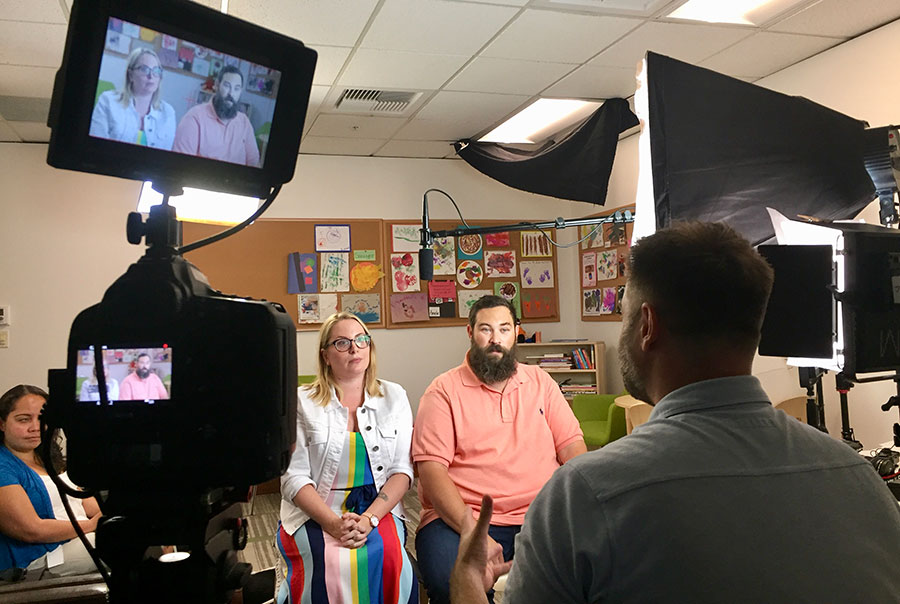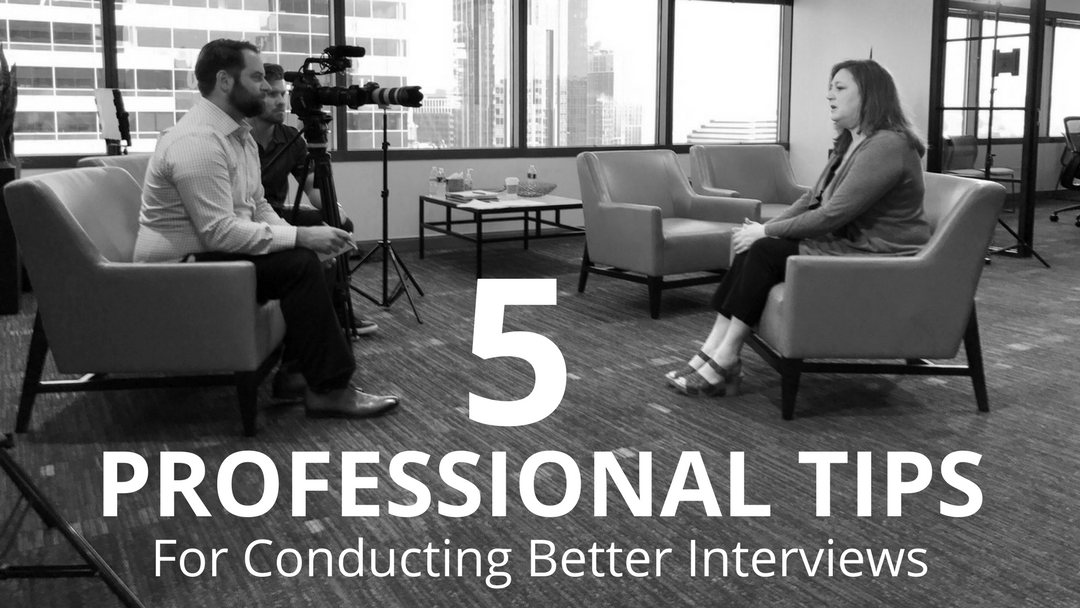There is definitely an art to conducting authentic interviews. I have to admit that’s a new realization for me, though. I spent more than a decade as a news reporter and sportscaster, interviewing athletes, politicians, celebrities, and more. Interviews were just a way of life for me. But once I left broadcasting and started my own video production and content creation company, I noticed that interviewing truly is a skill. Not everyone can do it. That’s why I’m here to share five professional tips for conducting better interviews.
It might seem like I’m going to drop unbelievable knowledge on you, but my tips for conducting better interviews are honestly very simple. I believe anyone can benefit from them. And just like anything else, (like my old basketball coach used to say) perfect practice makes perfect.

Five Professional Tips for Conducting Better Interviews
Tip #1 | Come Prepared
I know this seems like Interviewing 101, but it’s amazing how often preparation is overlooked. Know the story you want to tell, and know the questions you need to ask to find that story. There’s no bigger rally killer in an interview than staring at your sheet of paper to find the next question. If you’re not paying attention to the interviewee, they’re prone to getting uncomfortable. They think you want to move on and they cut their answers short. Knowing what you need to ask will give you and the interviewee confidence to keep the interview moving along. As the interviewee is answering your current question, simply glance down at your paper to remind yourself what’s coming next (don’t stare!). Always be prepared to ask the next question.
Tip #2 | It’s a Conversation
Conducting an interview for video production is no different from sitting down with your best friend at a coffee shop. Interviews don’t need to be uptight and uncomfortable. If your interviewee shares an interesting tidbit, don’t be afraid to stray off your written questions to learn more. If your friend tells you they are going on a blind date, you wouldn’t just skip over that and jump to the next topic, right? It’s no different here. You don’t get to the heart of a story by sitting on the surface, you have to dig deeper. The more someone opens up to you, the easier it is to share the story you really want to tell. The more conversational your interview is, the more natural the sound bites will be, and the better your video will turn out.
Tip #3 | Listen
This really goes hand-in-hand with my conversation tip, but I want to drive home how important it is to listen to your interviewee. It’s easy to get caught up in what’s coming next, but it’s more important to know the sound you’re gathering. Like I said before, it’s vital to know the story you want to tell before your interview. How do you know you’re getting the right material if you’re not listening to the answers? Not to mention, people typically stop talking if they feel like they’re not being heard. The more you play off each other, the smoother the video production interview will go.
Tip #4 | Avoid Polar Questions
A polar question is one that generates a yes-no answer. You need to avoid these at all cost. No great story is ever told with yes-no sound bites or quotes. If you’re going to interview kids, this tip is critically important. Most children want to say as little as possible when there is a camera in front of them, so you need to ask them open-ended questions. If you happen to fall into the yes-no trap (children or not), simply ask the interviewee to expand on their answer. Try to find out why they said yes or no. Again, you can’t find the heart of the story by floating on the surface. And there’s nothing more surface level than yes-no answers. Open-ended questions are always the answer.
Tip #5 | Anything Else?
I always ask my favorite question at the end of an video production interview. Here’s the question: Is there anything else you would like to add? At the end of the interview, you’ve already spent a lot of time going back and forth (whether that be ten minutes or an hour), and you’ve covered a lot of topics. Sometimes when you ask the “anything else” question — there’s nothing to add. But other times, it leads to amazing sound bites. The interviewee is finally free to say whatever they want. It’s often the most real, heartfelt, passionate sound you’ll get. It always seems to be the topic they want to hammer home the most, and they have a chance to say it or re-emphasize how important it is to them.

I know I didn’t just shower you with a magic potion, but these are my professional tips for conducting better interviews during your video production or elsewhere. I can’t stress how important all of these steps are. If you’re confident in your interviewing ability, then the interviewee can be confident in their answers. That will result in the most powerful sound bites, and in the end, the most intriguing video to share.
Go forth and conduct better interviews!
VIDEO PRODUCTION 101 POSTS
- How Long Should My Video Be?
- GoPro Starter Tips
- Stop Saying “Hey Everyone” in Your Videos
- Best iPhone Camera Settings for DIY Videos
- Tips for DIY Talking Head Videos
- Make a Quick Impression
Tim Lewis is the founder and chief storyteller at Seattle video production and content creation company Moarly Creative. He spent more than 12 years as a television news reporter and sportscaster, last working at KOMO in Seattle. If you’d like more of his professional tips, or if you’re interested in hiring Tim for your interviews and/or storytelling needs, contact him or connect on Facebook, Instagram, Twitter, YouTube and Vimeo.

